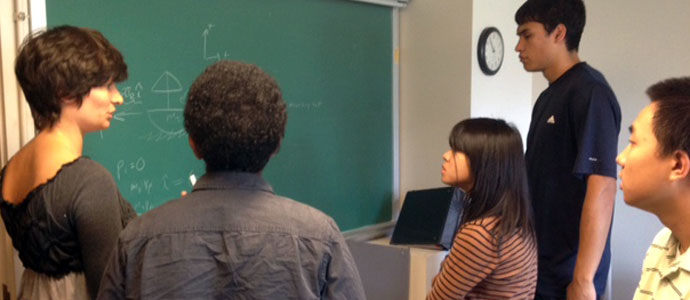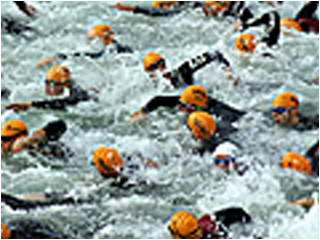
Students enjoy small class sizes and frequently engage in discussions during ESG classes. (Photo taken by Holly Sweet.)
Featured Courses
The Experimental Study Group (ESG) is a freshman learning community that promotes interactive education and curricular and pedagogical innovation at MIT.
ESG was established in 1969 to provide a more participatory, student-centered environment. Today it continues to experiment in new methods of teaching and learning, offering interactive, experiential classes and community-based education. ESG allows self-motivated students to take a more active role in their first year at MIT, with almost all the freshmen core subjects offered in much smaller class settings than are available in the regular curriculum to provide greater personal control over pacing and format. Over the years, students have consistently said that ESG's small-group learning, interactive teaching, and community atmosphere were some of the most rewarding aspects of their MIT education.
The biggest difference between my mainstream classes and my ESG classes is the relationship between the teachers and the students. I felt like my ESG classes were a sort of family.
Joel
Student
ESG staff includes faculty and lecturers from a variety of fields, including biology, chemistry, psychology, mathematics, mechanical engineering, physics, writing, and the visual arts. Fifty new MIT freshmen are accepted into the ESG community every year. In their upperclass years at MIT, these students can participate in ESG’s teaching program through assisting faculty and staff as tutors and teaching assistants. New student TAS enroll in a one-term teaching seminar which helps them develop good teaching and leadership skills. Under close faculty and staff supervision, qualified student instructors can develop and teach their own six unit pass/fail seminars.
In recent years, ESG has increasingly focused on two different aspects of curricular innovations both of which are funded primarily by contributions from ESG alumni. The first is the expansion of the ESG Seminar Series, which offers students a wider variety of educational opportunities outside of MIT's core curriculum. In keeping with the spirit of educational experimentation, ESG seminars focus on a wide variety of topics, offering instructors the flexibility to teach from their passion. Seminars are collegial in format, taught in small, interactive groups with hands-on activities and plenty of opportunity for student input. Seminars offered in recent years have included Chemistry of Sports, Speak Italian…with your mouth full, The Art and Science of Happiness, The Mathematics of Toys and Games, and Beyond a Website.
Another ESG curricular innovation capitalizes on the momentum started by various MIT initiatives about distance learning and online education. In spring of 2012, ESG set out to demonstrate a long held belief that when students teach their peers, they gain insight and command over the subject matter in ways which enrich their learning experience. With this thesis in mind, ESG piloted a project (called ESGx) that taught undergraduates to devise, teach, and create video content for problems taken directly from the MIT GIR curriculum. With close supervision by the ESG teaching staff, students created short videos that concisely explained and contextualized a problem in physics, math, chemistry, and biology. These videos used a variety of demonstrations and animations to help illustrate the problem in compelling ways. T his pilot project is being developed as a Spring 2013 seminar (Producing Educational Videos), sponsored by ESG and open to all MIT students.
In addition to participating in OCW and putting the ESG videos on TechTV for public viewing, ESG staff have generated textbooks from their original classes and seminars (i.e. A Creative Guide to Exploring Your Life) in order to broaden access to unique course material. ESG continues to strive to export its successful educational innovations to the regular curriculum and to educational settings outside of MIT wherever possible.
Experimental Study Group Courses
Archived Experimental Study Group Courses
Some prior versions of courses listed above have been archived in OCW's DSpace@MIT repository for long-term access and preservation. Links to archived prior versions of a course may be found on that course's "Other Versions" tab.
Additionally, the Archived Experimental Study Group Courses page has links to every archived course from this department.






